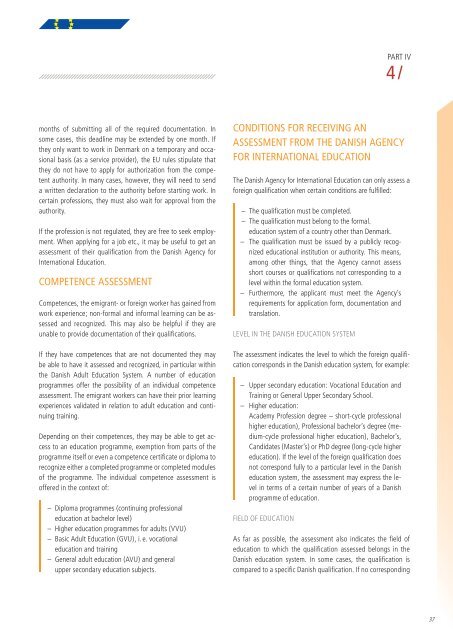RECOGNITION OF NON-FORMAL AND INFORMAL ... - Solidar
RECOGNITION OF NON-FORMAL AND INFORMAL ... - Solidar
RECOGNITION OF NON-FORMAL AND INFORMAL ... - Solidar
Create successful ePaper yourself
Turn your PDF publications into a flip-book with our unique Google optimized e-Paper software.
PART IV<br />
4 /<br />
months of submitting all of the required documentation. In<br />
some cases, this deadline may be extended by one month. If<br />
they only want to work in Denmark on a temporary and occasional<br />
basis (as a service provider), the EU rules stipulate that<br />
they do not have to apply for authorization from the competent<br />
authority. In many cases, however, they will need to send<br />
a written declaration to the authority before starting work. In<br />
certain professions, they must also wait for approval from the<br />
authority.<br />
If the profession is not regulated, they are free to seek employment.<br />
When applying for a job etc., it may be useful to get an<br />
assessment of their qualifi cation from the Danish Agency for<br />
International Education.<br />
COMPETENCE ASSESSMENT<br />
Competences, the emigrant- or foreign worker has gained from<br />
work experience; non-formal and informal learning can be assessed<br />
and recognized. This may also be helpful if they are<br />
unable to provide documentation of their qualifi cations.<br />
If they have competences that are not documented they may<br />
be able to have it assessed and recognized, in particular within<br />
the Danish Adult Education System. A number of education<br />
programmes offer the possibility of an individual competence<br />
assessment. The emigrant workers can have their prior learning<br />
experiences validated in relation to adult education and continuing<br />
training.<br />
Depending on their competences, they may be able to get access<br />
to an education programme, exemption from parts of the<br />
programme itself or even a competence certifi cate or diploma to<br />
recognize either a completed programme or completed modules<br />
of the programme. The individual competence assessment is<br />
offered in the context of:<br />
– Diploma programmes (continuing professional<br />
education at bachelor level)<br />
– Higher education programmes for adults (VVU)<br />
– Basic Adult Education (GVU), i. e. vocational<br />
education and training<br />
– General adult education (AVU) and general<br />
upper secondary education subjects.<br />
CONDITIONS FOR RECEIVING AN<br />
ASSESSMENT FROM THE DANISH AGENCY<br />
FOR INTERNATIONAL EDUCATION<br />
The Danish Agency for International Education can only assess a<br />
foreign qualifi cation when certain conditions are fulfi lled:<br />
– The qualifi cation must be completed.<br />
– The qualifi cation must belong to the formal.<br />
education system of a country other than Denmark.<br />
– The qualifi cation must be issued by a publicly recognized<br />
educational institution or authority. This means,<br />
among other things, that the Agency cannot assess<br />
short courses or qualifi cations not corresponding to a<br />
level within the formal education system.<br />
– Furthermore, the applicant must meet the Agency‘s<br />
requirements for application form, documentation and<br />
translation.<br />
LEVEL IN THE DANISH EDUCATION SYSTEM<br />
The assessment indicates the level to which the foreign qualifi -<br />
cation corresponds in the Danish education system, for example:<br />
– Upper secondary education: Vocational Education and<br />
Training or General Upper Secondary School.<br />
– Higher education:<br />
Academy Profession degree – short-cycle professional<br />
higher education), Professional bachelor‘s degree (medium-cycle<br />
professional higher education), Bachelor‘s,<br />
Candidates (Master‘s) or PhD degree (long-cycle higher<br />
education). If the level of the foreign qualifi cation does<br />
not correspond fully to a particular level in the Danish<br />
education system, the assessment may express the level<br />
in terms of a certain number of years of a Danish<br />
programme of education.<br />
FIELD <strong>OF</strong> EDUCATION<br />
As far as possible, the assessment also indicates the fi eld of<br />
education to which the qualifi cation assessed belongs in the<br />
Danish education system. In some cases, the qualifi cation is<br />
compared to a specifi c Danish qualifi cation. If no corresponding<br />
37
















